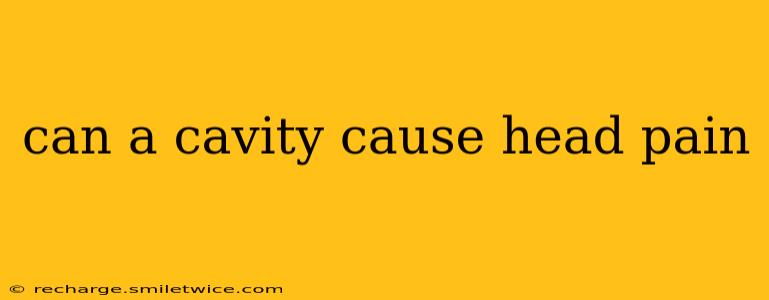Toothaches are undeniably painful, but did you know they can sometimes trigger headaches? While a cavity itself doesn't directly cause head pain, the inflammation and nerve irritation it creates can lead to referred pain in the head. This article will explore the connection between cavities and headaches, answering common questions and offering clarity on this often-misunderstood relationship.
What is Referred Pain?
Before diving into the cavity-headache link, let's understand referred pain. Referred pain occurs when pain felt in one area of the body actually originates from another. Your brain struggles to pinpoint the exact source of the pain signal, especially when the nerves from different parts of the body converge in the spinal cord. This is why a heart attack can sometimes be felt as pain in the left arm or jaw, and similarly, a severe toothache can radiate to the head.
How Can a Cavity Lead to a Headache?
A cavity, or dental caries, is a hole in the tooth caused by tooth decay. When bacteria break down tooth enamel, it exposes the dentin and pulp, the inner layers of the tooth containing nerves and blood vessels. This exposure leads to inflammation and irritation of these sensitive tissues.
The trigeminal nerve, a major cranial nerve responsible for sensation in the face, including teeth, is highly involved. When this nerve is irritated by the inflammation from a cavity, pain signals can travel along its pathways, sometimes extending to the head, resulting in a headache.
Can a Cavity Cause a Severe Headache?
The severity of the headache linked to a cavity varies greatly depending on several factors, including:
- The size and location of the cavity: Larger cavities closer to the nerve can cause more intense pain.
- The extent of infection or inflammation: An infected cavity will generally cause more severe pain than a simple cavity.
- Individual pain tolerance: Each person experiences pain differently.
- Presence of other contributing factors: Pre-existing conditions like sinus infections or tension headaches can exacerbate the pain.
While a cavity can contribute to a headache, it's unlikely to cause a severe migraine-type headache on its own. However, the pain can be intense enough to be mistaken for a migraine, particularly if the cavity is severe and untreated.
What Other Dental Problems Can Cause Headaches?
Cavities aren't the only dental issues that can cause headaches. Other potential culprits include:
- Abscesses: An abscess is a pocket of pus caused by an infection. The infection and pressure can create severe pain, leading to headaches.
- Gum disease (periodontitis): Severe gum inflammation can irritate nerves, potentially causing pain that radiates to the head.
- Temporomandibular joint (TMJ) disorders: Problems with the jaw joint can also lead to headaches, often involving facial pain.
- Bruxism (teeth grinding): Grinding or clenching your teeth can strain jaw muscles and lead to headaches.
How Can I Tell If My Headache is Related to a Cavity?
It's crucial to see a dentist for a proper diagnosis if you're experiencing headaches alongside tooth pain or other dental symptoms. They can perform an examination to determine the cause of the pain.
Here are some signs that suggest a dental origin:
- Pain localized near the teeth: The pain is often concentrated around one or more teeth.
- Pain that worsens when chewing or biting: This is a common sign of tooth decay or other dental problems.
- Sensitivity to hot or cold: Cavities often make teeth sensitive to temperature changes.
- Visible signs of decay: You may be able to see a hole or discoloration in your teeth.
When Should I See a Dentist or Doctor?
If you're experiencing headaches alongside tooth pain or other oral symptoms, you should schedule an appointment with your dentist as soon as possible. Don't delay seeking professional help, as untreated dental issues can worsen and lead to more significant health problems. Your doctor can also help determine if your headache has other underlying causes.
Conclusion:
While a cavity alone may not directly cause a headache, the associated inflammation and nerve irritation can trigger referred pain that manifests as a headache. Understanding the connection between toothaches and headaches can help you seek appropriate medical attention to address the underlying dental issue and alleviate the pain. Always consult with a dental professional for diagnosis and treatment.
